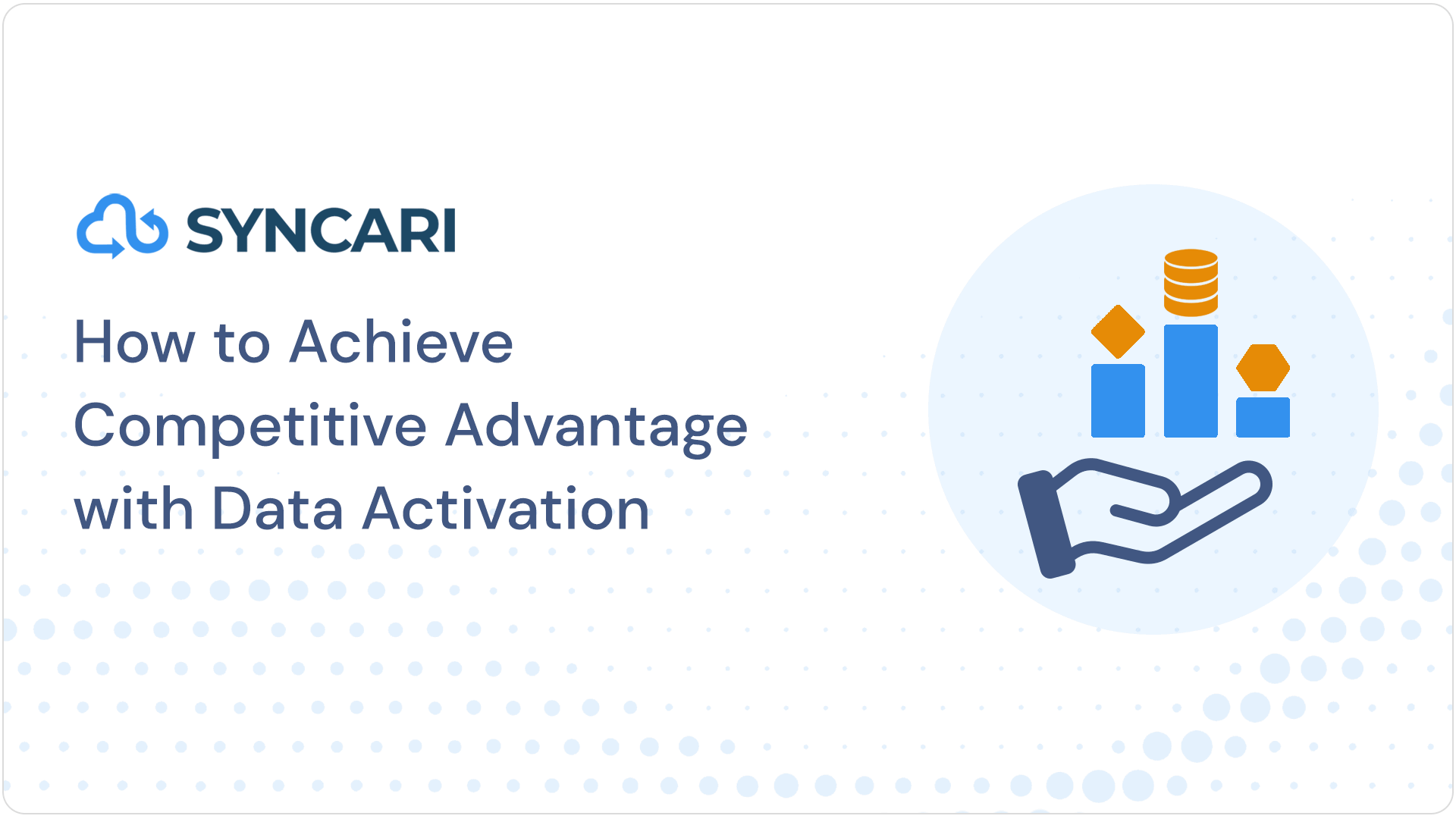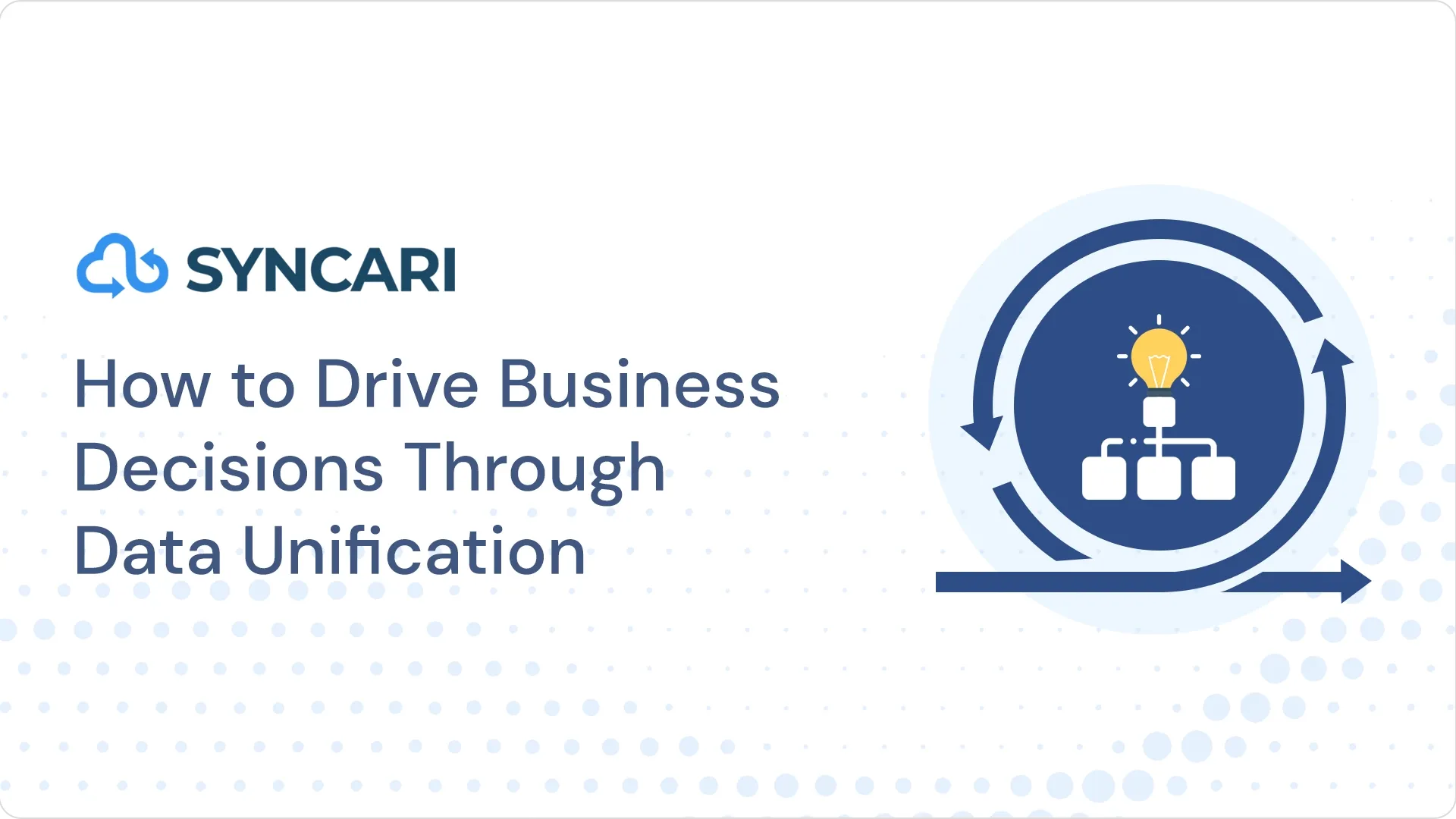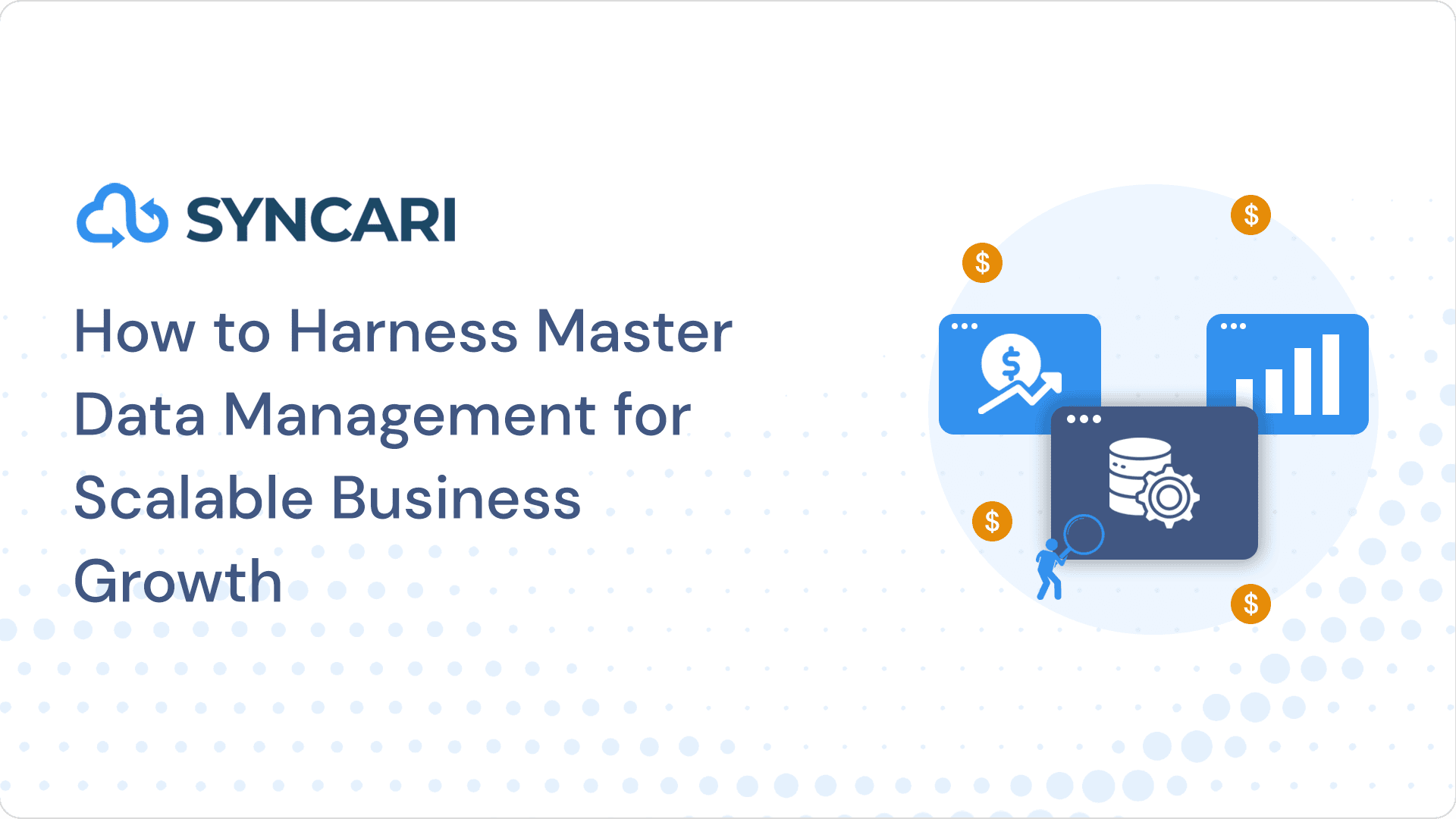Explore how businesses can use Syncari to streamline compliance processes, focusing on GDPR and HIPAA regulations, and how master data management supports robust data governance frameworks.
To achieve compliance with master data management, it is crucial to understand the importance of data privacy and data governance, and the steps involved in implementing master data management policies. By centralizing cross-functional data, eliminating data silos, and ensuring data quality, master data services can help ensure data integrity, security, and regulatory compliance. Additionally, a well-designed master data management policy can integrate privacy regulations and make it easier to comply with data erasure rights. To learn more about the benefits of master data management and how it can go beyond just compliance, continue reading the rest of the article.
Master Compliance with Master Data Management: A Key Player in Compliance and Industry Applications
Master Data Management (MDM) is a versatile and critical solution that extends beyond general compliance, offering specialized applications across various industries. Here’s a refined overview emphasizing MDM's role in different sectors:
Software-as-a-Service (SaaS) and High Technology Industries
In SaaS and high technology sectors, MDM plays a crucial role in enhancing information sharing and ensuring compliance with Know Your Customer (KYC) regulations. It supports solvency and anti-fraud efforts, manages consent, and facilitates comprehensive reporting. MDM helps these industries to maintain accurate customer records, enabling better service delivery and regulatory adherence.
Manufacturing to Healthcare Sectors
In the manufacturing and healthcare sectors, MDM ensures regulatory compliance and enhances operational efficiency. It enables the delivery of personalized experiences to customers or patients, accelerating digital transformation initiatives. MDM also plays a pivotal role in risk management, providing a competitive edge through improved data quality and streamlined processes.
Syncari’s Role in MDM
Syncari’s platform exemplifies the potential of MDM across industries by offering advanced data management and automation capabilities:
- Data Quality and Governance: Syncari’s features include data cleansing, enrichment, global ID unification, and deduplication, which are essential for maintaining high data quality and compliance across sectors.
- Advanced Automation: Syncari supports complex workflows and multi-directional synchronization, allowing businesses to automate processes triggered by data changes. This capability enhances operational efficiency and data-driven decision-making.
- Compliance and Reporting: With robust governance frameworks, Syncari ensures data compliance with industry regulations like GDPR and HIPAA. Its audit logs, version control, and role-based access controls provide a secure and compliant data management environment.
- Scalability and Integration: Syncari’s scalable architecture and seamless integration capabilities enable businesses to handle increasing data volumes and complex data environments efficiently. This adaptability is crucial for industries undergoing rapid growth and digital transformation.
Industry-Specific Benefits
- SaaS and High Tech: Syncari’s automation and real-time data synchronization capabilities are particularly beneficial for these fast-paced industries, ensuring accurate and up-to-date customer data for better compliance and service delivery.
- Manufacturing and Healthcare: Syncari’s data unification and quality management features help these sectors maintain regulatory compliance and operational efficiency, facilitating personalized customer and patient experiences.
Syncari’s approach to MDM highlights its ability to turn raw data into actionable insights, driving the complete data lifecycle and generating a return on investment (ROI) for its users. By providing a comprehensive and adaptable platform, Syncari supports diverse industry needs, from regulatory compliance to enhanced efficiency and personalized service delivery.
Achieving Compliance: Steps and Challenges
Choosing the right Master Data Management (MDM) solution involves several critical steps and considerations to ensure that it aligns with your organization’s needs and addresses potential challenges effectively. Here’s a detailed guide to help you make an informed decision:
Steps to Choose the Right MDM Solution
- Assess Your Business Needs and Objectives
- Identify Pain Points: Determine specific issues your organization faces regarding data management, such as data silos, poor data quality, or compliance requirements.
- Define Objectives: Clearly outline what you aim to achieve with an MDM solution, such as improved data accuracy, better regulatory compliance, or enhanced customer insights.
2. Involve Key Stakeholders
- Gather Input: Include representatives from different departments (IT, compliance, marketing, sales, etc.) to understand their data needs and challenges.
- Align Goals: Ensure that the MDM goals align with overall business objectives and stakeholder expectations.
3. Evaluate MDM Capabilities
- Data Integration: Look for solutions that offer robust data integration capabilities, supporting various data sources and formats.
- Data Quality and Governance: Ensure the MDM solution provides tools for data cleansing, enrichment, deduplication, and governance.
- Scalability: Choose a solution that can scale with your business growth and handle increasing data volumes and complexity.
4. Consider Technical Requirements
- Compatibility: Ensure the MDM solution integrates seamlessly with your existing IT infrastructure and applications.
- Customization and Flexibility: The solution should offer customization options to fit your specific business processes and requirements.
- User-Friendly Interface: Opt for a solution with an intuitive interface that can be easily used by both technical and non-technical users.
5. Evaluate Vendor Expertise and Support
- Reputation and Experience: Assess the vendor’s reputation, industry experience, and expertise in MDM.
- Customer Support: Consider the quality of customer support and professional services offered by the vendor.
6. Pilot Testing
- Proof of Concept (PoC): Conduct a PoC to test the MDM solution in a controlled environment, focusing on critical use cases.
- Evaluate Performance: Assess the solution’s performance, ease of use, and ability to meet your data management needs.
7. Cost Analysis
- Total Cost of Ownership (TCO): Evaluate the initial setup costs, licensing fees, maintenance, and any additional costs.
- ROI Estimation: Estimate the potential return on investment by considering the solution’s impact on data quality, compliance, and business processes.
8. Implementation Plan
- Roadmap: Develop a detailed implementation plan with clear timelines, milestones, and responsibilities.
- Change Management: Prepare for organizational change by training staff and establishing new data management processes.
Challenges in Implementing an MDM Solution
- Data Silos and Integration Complexity
- Challenge: Integrating data from disparate systems can be complex and time-consuming.
- Solution: Choose an MDM solution with strong integration capabilities and support for various data sources and formats.
2. Data Quality Issues
- Challenge: Poor data quality can undermine the effectiveness of an MDM solution.
- Solution: Implement robust data cleansing, enrichment, and governance processes to ensure high-quality data.
3. Stakeholder Buy-In
- Challenge: Securing buy-in from all stakeholders can be difficult, especially if the benefits of MDM are not immediately clear.
- Solution: Clearly communicate the benefits and involve stakeholders early in the decision-making process.
4. Scalability Concerns
- Challenge: The chosen solution may not scale effectively as the organization grows.
- Solution: Select a scalable MDM solution that can handle increasing data volumes and complexity.
5. Change Management
- Challenge: Implementing an MDM solution often requires significant changes to existing processes and systems.
- Solution: Develop a comprehensive change management plan, including training and support for users.
6. Regulatory Compliance
- Challenge: Ensuring compliance with industry regulations and standards can be challenging.
- Solution: Choose an MDM solution with strong governance and compliance features, such as audit trails, role-based access, and data privacy controls.
7. Cost Management
- Challenge: Managing the costs associated with MDM implementation and ongoing maintenance.
- Solution: Conduct a thorough cost-benefit analysis and choose a solution that offers a good balance between cost and functionality.
By following these steps and addressing the potential challenges, you can select an MDM solution that not only meets your current needs but also scales with your business growth and helps achieve long-term data management objectives.
The Advantages of Compliance and Industry-Specific Applications
Compliance with data privacy regulations is crucial for organizations to avoid legal, financial, and reputation consequences. By investing in compliance capabilities, businesses can build consumer trust, achieve market differentiation, and gain a competitive edge. Compliance also enhances analytics and business intelligence by providing better control over data. Syncari Autonomous Data Management offers data privacy compliance automation, enabling organizations to automate data subject request processes and effectively democratize data.
MDM compliance has specific advantages in various sectors. Enterprises can leverage Syncari to streamline compliance processes and master compliance with Master Data Management, focusing on GDPR and HIPAA regulations. For instance, MDM supports sustainable practices and enables efficient ESG reporting by maintaining accurate data on sustainability metrics. In the area of trade, MDM is essential for centralized control, accurate product classification, and efficient document management, ensuring proper validation for trade compliance.
Harnessing the Power of Syncari for Master Data Management
As we navigate the evolving landscape of compliance and master data management, the need for a robust, reliable, and innovative solution becomes increasingly apparent. Syncari, with its unique ability to sync, unify, automate, and analyze data across business systems and applications, emerges as a game-changer. It's not just about compliance; it's about operational efficiency, data accuracy, and preparing for an AI-driven future.
Syncari MDM 3.0: Eakes Office Solutions Case Study
Eakes Office Solutions needed a complete view of their data to drive better customer experiences.
Eakes Office Solutions, a leading provider of office supplies and technology, faced a significant hurdle due to fragmented customer data spread across multiple systems. This fragmentation obstructed their capacity to engage customers personally and effectively utilize transaction data for tailored marketing campaigns.
Eakes Office Solutions, as a business prioritizes efficient service and customer satisfaction, continually adapts to the evolving needs of the digital marketplace, aiming to optimize operations and enhance customer relationships through innovative technological solutions.
To address these data fragmentation challenges, Eakes Office Solutions turned to Syncari to overhaul their data management strategies. By adopting Syncari’s unified data automation platform, they were able to consolidate their customer information into one central system. This integration facilitated a streamlined, data-driven approach that not only enhanced personalized customer interactions but also empowered their marketing team to deploy more targeted and impactful campaigns.
By choosing Syncari, you're not just selecting a one-time endpoint tool; you're opting for a modernization of your enterprise data. You're aligning with industry leaders who trust Syncari to drive their businesses toward unparalleled efficiency and success in the digital age.
FAQs:
What is compliance in MDM?
Compliance in MDM refers to the adherence to policies and systems that ensure data protection laws are followed, such as GDPR and KYC regulations. It involves implementing measures to meet the requirements set forth by these regulations to protect sensitive information effectively.
What is data management compliance?
Data management compliance refers to the structured framework that organizations follow to adhere to laws, regulations, and standards related to their data. It involves overseeing how data is owned, stored, organized and managed to safeguard it from risks like loss, theft, or misuse.
What are the five core functions of master data management?
The five core functions of master data management include extending existing data governance programs, cleansing and correcting erroneous data, monitoring data quality, reporting, and managing business taxonomy and hierarchies. These functions are essential for maintaining accurate and consistent data across an organization.
What are the requirements for successful master data management?
Successful master data management requires setting clear objectives, understanding that it's more than just a database, partnering with key stakeholders, measuring and communicating business value, and ensuring information backfilling for future stages. These steps are crucial for effective MDM implementation and maintenance.


